Orval
Well-Known Member
- Joined
- Apr 3, 2021
- Messages
- 93
- Reaction score
- 34
We have lots of mangoes here and the price was not that high, so I asked my wife to keep some mangoes for me, we have about twelve different varieties, I managed to keep a certain balance between sweetness and acidity.
My first batch was a trial...
Water 10 litres
Mangoes:7.5 kg
Sugar:2.5 kg
Pectinase:0.2% in g/Litre
Yeast: Lalvin EC-1118, half a pack could do it (2.5g) (Champagne yeast saccharomyces Banyanus)
Bentonite:0.4g/l (two teaspoons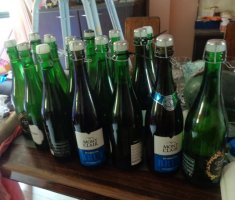

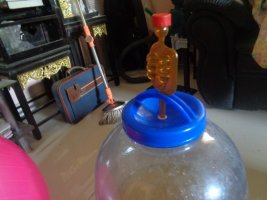

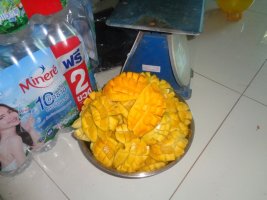
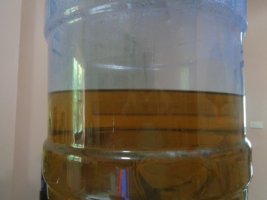

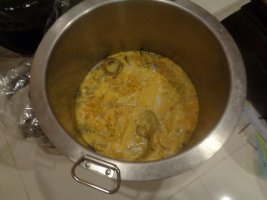 delayed in hot water)
delayed in hot water)
Vessels: one SS fermenter Ø40cm x 40 cm H, one 25-litre plastic carboy with airlock
One siphon, I bought a racking cane that appeared to be a piece of crab, I used its silicone hose as a siphon to bottle my wine.
Cut the mangoes in half to remove the seed, cut the flesh in order to form little cubes still attached to the skin, this increases the contact surface. Bring the water to boil with the sugar in order to dissolve it.
When the water is boiling, pour the fruit into it and cover.
Leave it overnight until T° <30 °C, then add the pectinase and wait for 1.5 hours.
Reactivate the yeast and add the yeast.
After two days, push the mango flesh down into your most.
After 5 days, rack your wine into the carboy together with the bentonite, I added a tablespoon of sugar to make sure I get a CO2 protection layer on top of my wine. (CO2 is heavier than air)
The experience showed me I'd better used a BIAB bag, this is what I did for my second attempt, I could press the mangoes and get a better yield. The mango flesh of this first batch ended in my pot still, but this wasn't the effort worth.
This first batch gave me 15 champagne bottles, I added 12.5g of sugar to get +/-4 to 5 Vol CO2.
The second batch gave me much more thanks to the BIAB bag, I made three sparkling wine bottles as I still got three champagne bottles, I made a test with 4 beer bottles where I added half of the amount of sugar, and got 24 additional still wine bottles.
Second batch:
13.5Litres of water
10.1 kg of mangoes
3.4 kg sugar
I took into account that, on average, 100g of mangoes contain 14.3 g of sugar and 83 g of water.
My first batch was a trial...
Water 10 litres
Mangoes:7.5 kg
Sugar:2.5 kg
Pectinase:0.2% in g/Litre
Yeast: Lalvin EC-1118, half a pack could do it (2.5g) (Champagne yeast saccharomyces Banyanus)
Bentonite:0.4g/l (two teaspoons







 delayed in hot water)
delayed in hot water)Vessels: one SS fermenter Ø40cm x 40 cm H, one 25-litre plastic carboy with airlock
One siphon, I bought a racking cane that appeared to be a piece of crab, I used its silicone hose as a siphon to bottle my wine.
Cut the mangoes in half to remove the seed, cut the flesh in order to form little cubes still attached to the skin, this increases the contact surface. Bring the water to boil with the sugar in order to dissolve it.
When the water is boiling, pour the fruit into it and cover.
Leave it overnight until T° <30 °C, then add the pectinase and wait for 1.5 hours.
Reactivate the yeast and add the yeast.
After two days, push the mango flesh down into your most.
After 5 days, rack your wine into the carboy together with the bentonite, I added a tablespoon of sugar to make sure I get a CO2 protection layer on top of my wine. (CO2 is heavier than air)
The experience showed me I'd better used a BIAB bag, this is what I did for my second attempt, I could press the mangoes and get a better yield. The mango flesh of this first batch ended in my pot still, but this wasn't the effort worth.
This first batch gave me 15 champagne bottles, I added 12.5g of sugar to get +/-4 to 5 Vol CO2.
The second batch gave me much more thanks to the BIAB bag, I made three sparkling wine bottles as I still got three champagne bottles, I made a test with 4 beer bottles where I added half of the amount of sugar, and got 24 additional still wine bottles.
Second batch:
13.5Litres of water
10.1 kg of mangoes
3.4 kg sugar
I took into account that, on average, 100g of mangoes contain 14.3 g of sugar and 83 g of water.


